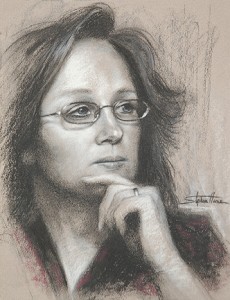
Without my glasses, I’m as blind as a rock. The myopic gene with which my father gifted me is so bad
(“How bad is it?”)
that I got into an argument with an ophthalmologist once about when I first needed glasses:
“With eyesight this bad, you needed glasses as soon as you exited the birth canal,” he announced.
“I was nine. Prior to that, I did see.”
“No, you didn’t.”
There’s a reason I get irritated with experts. Having grown up with them, I know that their hearing isn’t particularly good. You know, the Biblical eyes that never see and ears that never hear thing.
Which brings up my hearing. Standard convention is that, when one sense doesn’t work well, the other senses compensate, which would be true in my case if 1) I didn’t wear glasses that enable me to see like normal people and 2) I didn’t have hearing loss as well.
So the way I compensate is by being an extra visual person, which works as long as my glasses are on my face. I stare at people’s eyes, lips, and overall faces to fill in the gaps. While I try to be subtle about this, subtlety is not a particular gift of mine, and there’s a reason why people label me as “intense.”
We don’t see the hidden things
But the upshot is, I am a very, very visual person, and I make decisions and come to conclusions largely on the basis of things I see — literally in front of my face. In this, I’m not particularly different from most human beings, interpreting our world, our lives, our future, and our hope based upon the concrete world that we can see, hear, touch, smell, taste, and feel with our physical senses.

The only problem with this is that so much of our world and our lives is unseen — a spiritual realm that exists as much, or more, as subatomic particles, only we believe in subatomic particles because scientists have finally spotted them in a microscope and announced that they exist. God, and His realm, is either too small or too big to fit under the microscope, so even Christians have difficulty accepting the reality of this unseen world, and we operate our moments, our days, and our entire lives as if the only reality was the one we bump into at night when the lights are off.
This leads us into a lot of fear.
Panic and Fear
In 2 Kings 6:15, the prophet Elisha and his servant were staying in Dothan, and one morning when the servant awoke, he found the city surrounded by hostile military forces, who were there primarily to grab the troublesome Elisha and dispense with him.
“‘Oh my lord, what shall we do?’ the servant asked.”
This simple sentence doesn’t remotely convey the sense of panic, dismay, and abject terror that the servant no doubt felt upon seeing the city ringed, his master on the hit list, and himself significantly associated with his master, but be assured that he was afraid, very very afraid. What he saw didn’t look too promising — kind of like your life sometimes, or mine.
“‘Don’t be afraid,’ the prophet answered. ‘Those who are with us are more than those who are with them.'”
Hope beyond our own (very) limited efforts
If this is true — and it is — then it is way cool, because it means that what we see isn’t what we get, and we as Christians have hope for power, resources, help, and hope from outside of our own sad, pathetic efforts. We don’t have to be solely responsible for solving every problem in our life, but can look to our unseen Father and say,
“I don’t know what to do. But I’m not alone, and the forces that are with and behind me are greater than the forces that are with my enemy/problem/situation/conundrum. Tell me what to do, and I’ll do it; tell me to get out of the way, and I will; tell me to be still, and I’ll try real, real hard.”
You’re not alone. You never are. The Holy Spirit lives within you, Jesus walks beside you, God the Father holds you in His arms. And an unseen army is fighting on your behalf.

